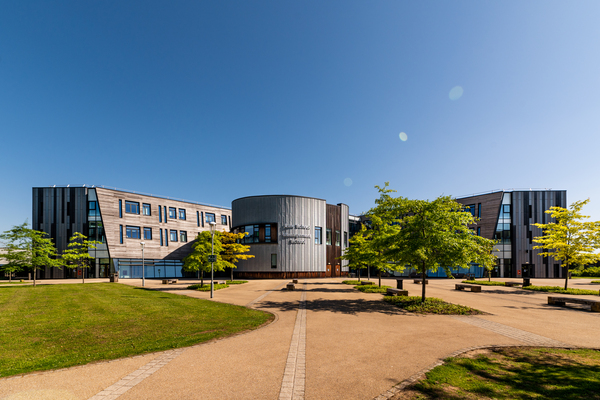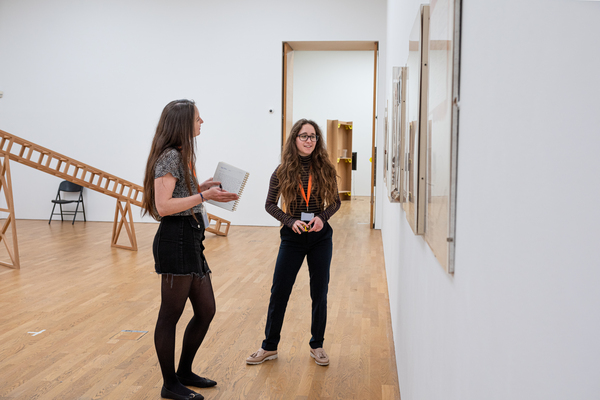
LLM Art Law
Gain specialist legal knowledge of the art trade
Year of entry: 2025 (September)
The global trade in art is now a multi-billion dollar industry. In this evolving market, the need for experts to negotiate, analyse and understand the art world is ever more apparent.
Art law is an exciting and fast-developing area, tackling issues surrounding the legal treatment of fine art and cultural heritage. Our LLM in Art Law is a unique collaborative and interdisciplinary course, co-taught by academic specialists from York Law School and the Department of History of Art.
You'll gain a deep understanding of the complex legal, social and ethical issues in the art world and learn essential skills of analysis and negotiation. A wide range of networking opportunities and masterclasses - in addition to a compulsory field trip - means you'll gain practical, in-depth knowledge of the field, invaluable for careers in the trade or further academic study.
This course is led by York Law School.
Course content
The LLM Art Law will provide you with a comprehensive appreciation of the complexities of art law, regardless of whether you have an existing legal or art history background.
The course consists of:
- Introductory modules
- Core taught modules
- Option modules
- Dissertation
There is also a compulsory field trip as part of the course, which will demonstrate some of the realities of working in the industry.
Modules
Core modules
- Art: A Problematic Life Cycle
- Art: Commodity or Valuable
- Law and Art: Parallel Perspectives
- Legal Systems and Research Methods
Option modules
You will study one option module from the Department of History of Art. This module will allow you to consider your chosen topic from both a legal and art historical point of view, as well as build up your specific-subject knowledge.
In previous years, options have covered topics such as:
- Art, Mass Media and Communication
- Ceramic Arts of the Islamic World
- Painting on Light: Stained Glass in the Medieval Tradition
Our modules may change to reflect the latest academic thinking and expertise of our staff, and in line with Department/School academic planning.
Learning outcomes
Every course at York is built on a distinctive set of learning outcomes. These will give you a clear understanding of what you will be able to accomplish at the end of the course and help you explain what you can offer employers. Our academics identify the knowledge, skills, and experiences you'll need upon graduation and then design the course to get you there.
Learning outcomes for this course
- Evidence a systematic understanding at an advanced level of the interaction of institutions, participants, regulations, and market practices operating in the art world at a national, Anglo-American, European and international level, and their impact on the development of aspects of art law and policies
- Demonstrate a sophisticated facility in understanding, contextualising, synthesising and applying legal, art historical and art law sources, evidence and research to a wide range of complex and integrated situations
- Exhibit a high-level ability to acquire knowledge and skills in separate disciplines of law and art history; coupled also with the ability to synthesise both disciplines and demonstrate significant capacity in evaluating critically the dynamic interaction between law and art history, when applied to legal, commercial, artistic and ethical art law problems
- Demonstrate assured application and adaptation of problem-solving skills involving analysis and evaluation of facts, parties’ interests and objectives, and identification of legal, ethical, commercial and practical issues and risks, and an advanced ability to work independently and collaboratively to develop effective and creative solutions to unfamiliar and complex problems
- Evince a highly developed ability to reflect and be constructively critical of own personal development and achievement both when working individually and collaboratively. Recognise and implement the personal responsibilities inherent in the process of self-directed learning at an appropriate level for postgraduate study and continuing professional development
- Demonstrate confident and effective communication at an advanced level, both verbally and in writing, suitable for a variety of audiences; present well-reasoned, nuanced arguments, opinions and advice, supported by critically evaluated evidence and abiding by recognised norms of academic and professional integrity
- Undertake efficient and effective independent and collaborative research strategies to identify, retrieve and evaluate appropriate legal and art historical sources, methodologies, rules, principles and theories relevant to diverse, complex and integrated legal, art historical, practical or theoretical problems
- Demonstrate enhanced skills of independent learning, including an ability to plan, time-manage, implement and complete a substantial independent research project in art law, utilising the skills and knowledge developed on the programme drawn from legal and art historical studies and critically applied to a chosen research question
Fees and funding
Annual tuition fees for 2025/26
| Study mode | UK (home) | International and EU |
|---|---|---|
| Full-time (1 year) | £14,540 | £28,500 |
Students on a Student Visa are not currently permitted to study part-time at York.
Fees information
UK (home) or international fees? The level of fee that you will be asked to pay depends on whether you're classed as a UK (home) or international student. Check your fee status.
Find out more information about tuition fees and how to pay them.
Additional costs
Field trips are currently funded by the Law School.
Funding information
Discover your funding options to help with tuition fees and living costs.
We'll confirm more funding opportunities for students joining us in 2025/26 throughout the year.
If you've successfully completed an undergraduate degree at York you could be eligible for a 10% Masters fee discount.
Funding opportunities
Chevening Scholarships
We are pleased to work with Chevening Scholars to offer funding for our Masters programmes. Chevening Scholarships provide one year of fully-funded postgraduate study in the UK for international (including EU) students. The scholarships are open to early and mid-career professionals who have the potential to become future leaders.
Teaching and assessment
You’ll work with world‐leading academics who’ll challenge you to think independently and excel in all that you do. Our approach to teaching will provide you with the knowledge, opportunities, and support you need to grow and succeed in a global workplace.
Teaching format
The LLM Art Law uses a number of teaching methods, including problem-based learning (PBL). PBL provides you with the opportunity to work both individually and collaboratively (in a student law firm) on a variety of real-life simulations.
These simulations will enable you to experience the multi-faceted nature of art law disputes. The process of working through each case will help you to develop a broad range of legal and research skills, including:
- reasoning and judgement
- document and case analysis
- problem solving
- negotiation and mediation
- advocacy
Additionally, you will have opportunities to develop your presentation and oral skills in debates and reading group sessions.
Teaching location
York Law School is located on Campus East. Nearly all of your teaching will take place within the Law building or nearby on Campus East.
About our campus
Our beautiful green campus offers a student-friendly setting in which to live and study, within easy reach of the action in the city centre. It's easy to get around campus - everything is within walking or pedalling distance, or you can always use the fast and frequent bus service.
Assessment and feedback
Different modules use different types of assessment to provide variety and develop different transferable skills. These include presentations, posters, participation in seminars, client advice, coursework and your dissertation.
Careers and skills
The skills you'll gain from studying at York Law School are widely in demand in the legal sector. You'll get active support in careers and development planning, both through structured sessions and workshops, and individual advice from our Employability Tutor.
We encourage you to get involved with our Careers and Development Programme. The bespoke programme includes several employers, providing an insight into the legal profession and the relevant recruitment processes. There is also help available for those of you who are thinking about non-legal employers or academic routes following your LLM.
Career opportunities
Although most graduates from York Law School choose to enter legal fields, others have gone on to gain employment in sectors such as:
- Finance
- Health and social work
- Public administration
- Retail
Graduates from the Department of History of Art benefit from excellent relationships with numerous museums and galleries and work in a wide-range of careers including:
- Museums, galleries and auction houses
- Cultural management
- Heritage and conservation
- Journalism and media
- Teaching
- Education
- Art administration
Finally, the research skills you'll develop are an excellent foundation for further research. Many of our successful LLM graduates have gone on to pursue PhD studies, both at York and elsewhere.
Transferable skills
- Research skills
- Communication and presentation skills
- Analytical and problem solving skills
- Project management
- Reasoning and judgement
- Document and case analysis
- Negotiation and mediation
- Advocacy
Entry requirements
| Qualification | Typical offer |
|---|---|
| Undergraduate degree | 2:2 or equivalent in Law, History of Art or another subject. |
| Other international qualifications | Equivalent qualifications from your country |
Additional requirements
You will need to submit an example of written work with your application. Please see our guidance on submitting written work.
English language
If English isn't your first language you may need to provide evidence of your English language ability. We accept the following qualifications:
| Qualification | Minimum requirement |
|---|---|
| IELTS (Academic and Indicator) | 6.5, minimum 6.0 in each component |
| Cambridge CEFR | B2 First: 176, with 169 in each component |
| Oxford ELLT | 7, minimum of 6 in each component |
| Oxford Test of English Advanced | 136, minimum 126 in each component |
| Duolingo | 120, minimum 105 in all other components |
| LanguageCert SELT | B2 with 33/50 in each component |
| LanguageCert Academic | 70 with a minimum of 65 in each component |
| Kaplan Test of English Language | 478-509, with 444-477 in all other components |
| Skills for English | B2: Merit overall, with Pass with Merit in each component |
| PTE Academic | 61, minimum 55 in each component |
| TOEFL | 87, minimum of 21 in each component |
| Trinity ISE III | Merit in all requirements |
For more information see our postgraduate English language requirements.
If you haven't met our English language requirements
You may be eligible for one of our pre-sessional English language courses. These courses will provide you with the level of English needed to meet the conditions of your offer.
The length of course you need to take depends on your current English language test scores and how much you need to improve to reach our English language requirements.
After you've accepted your offer to study at York, we'll confirm which pre-sessional course you should apply to via You@York.
Next steps
Contact us
Get in touch if you have any questions

Department
Related courses
Discover York







